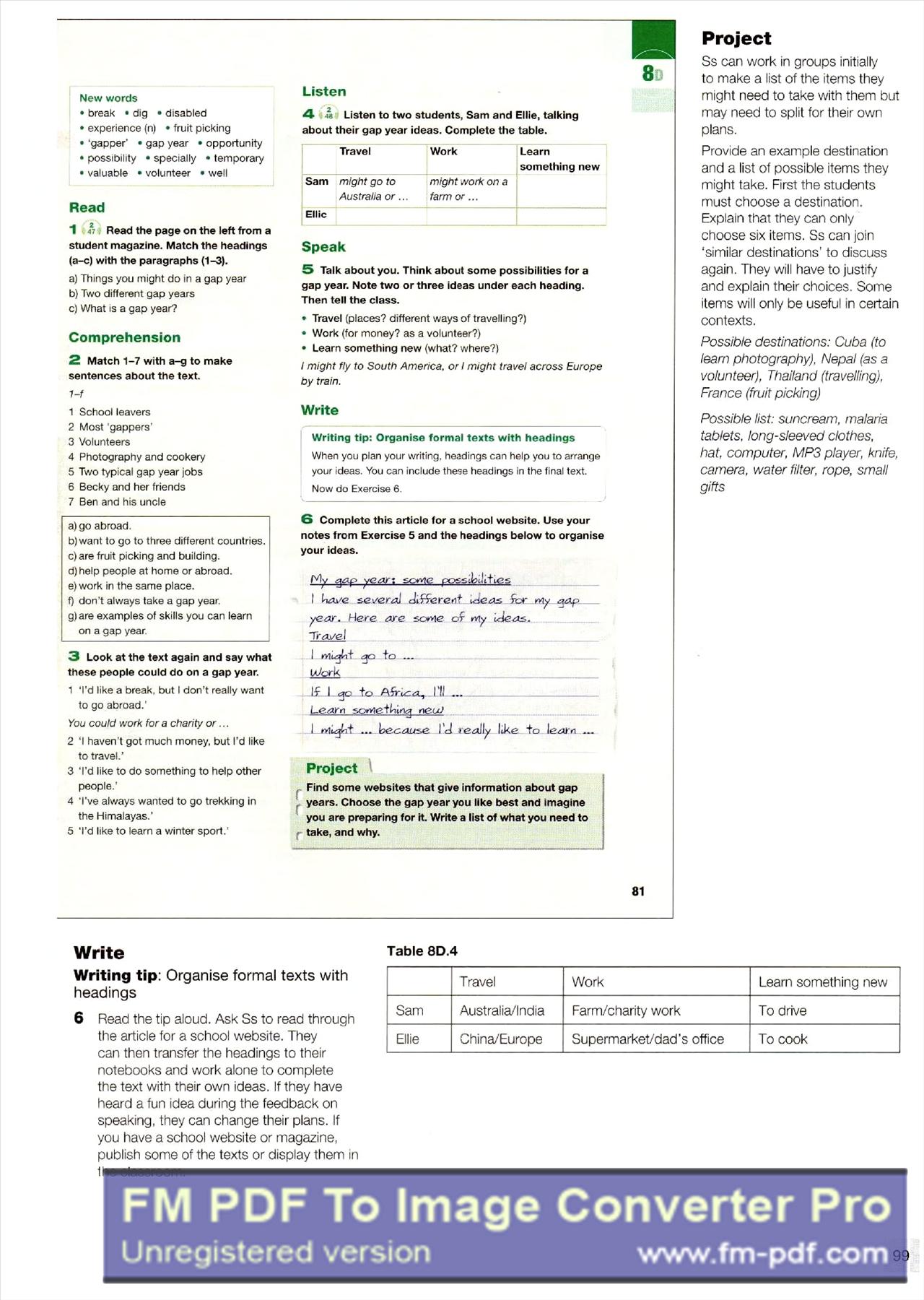Up¾at 3 Teacher's Book podrecznik nauczyciela plus odpowiedzi ,testy,klucz answer key Page 098


8
New words
• break • dig • disabled
• experience (n) • fruit picking
• *gapper' • gap year • opportunity
• possibility • specially • temporary
• valuable • vo!unteer • well
Lister)
4 ia Listen to two students, Sam and Ellie, talking about their gap year ideas. Complete the table.
Read
1 £ Read the page on the left from a student magazine. Match the headings (a-c) with the paragraphs (1-3).
a) Things you might do in a gap year
b) Two different gap years
c) What is a gap year?
Comprehension
2 Match 1-7 with a-g to make sentences about the text.
1-f
1 School leavers
2 Most ‘gappers’
3 Volunteers
4 Photography and cookery
5 Two typical gap year jobs
6 Becky and her friends
7 Ben and his uncle
a) go abroad.
b) want to go to three different countries.
c) are fruit picking and building.
d) help people at home or abroad.
e) work in the same place.
f) don’t always take a gap year.
g) are examples of skills you can learn on a gap year.
3 Look at the text again and say what these people could do on a gap year.
1 Td like a break, but I don’t really want to go abroad.*
You could work for a charity or...
2 ‘I haven't got much money. but l'd like to travel.f
3 Td like to do something to help other people.'
4 Tve always wanted to go trekking in the Himalayas.’
5 Td like to learn a winter sport.'
|
Travel |
Work |
Learn something new | |
|
Sam |
might go to Australia or... |
might nrork on a farm or... | |
|
Ellic | |||
Speak
5 Talk about you. Think about some possibilities for a gap year. NotÄ™ two or three ideas under each heading. Then tell the class.
• Travel (places? different ways of travellmg?)
• Work (for money? as a volunteer?)
• Learn something new (what? where?)
I might fly to South America, or I might travel across EuropÄ™ by train.
Write
Writing tip: Organise formal texts with headings
When you plan your writing. headings can help you to arrange your ideas. You can include these headings in the finał text. Now do Exercise 6.
6 Complete this article for a school website. Use your notes from Exercise 5 and the headings below to organise your ideas.
My yeor\ sÄ™+yje ppsstkiitfies
I Uo±'e seserol different ideas, for my aexp year. Herc are some of my idea.s.
Tras/el
I wiuzyit ap to —
U^ork
If I ap to AUl ...
Learn something neuJ
I miajnt ... hec-ause J'J really like to learn ...
Project
Ss can work in groups initially to make a list of the items they might need to take with them but may need to Split for their own plans.
Provide an example destination and a list of possible items they might take. First the students must choose a destination. Explain that they can only choose six items. Ss can join ‘similar destinations' to discuss again. They will have to justify and explain their choices. Some items will only be useful in certain contexts.
Possible destinations: Cuba (to learn photography). Nepal (as a volunteer), Thailand (travel(ing), France (fruit picking)
Possible list: suncream, malaria tabiets. Iong-sIeeved clothes, hat, Computer, MP3 player, knife, camera, water filter. ropÄ™, smali gifts
Find some websites that give information about gap years. Choose the gap year you like best and imagine you are preparing for Å‚t Write a list of what you need to take, and why.
Writing tip: Organise formal texts with headings
6 Read the tip aloud. Ask Ss to read through the article for a school website. They can then transfer the headings to their notebooks and work alone to complete the text with their own ideas. If they have heard a fun idea during the feedback on speaking, they can change their plans. If you have a school website or magazine, publish some of the texts or display them in
Table 8D.4
|
Travel |
Work |
Learn something new | |
|
Sam |
Australia/lndia |
Farm/charity work |
To drive |
|
Ellie |
China/Europe |
Supermarket/dad’s Office |
To cook |
Wyszukiwarka
Podobne podstrony:
Up?at 3 Teacher s Book podrecznik nauczyciela plus odpowiedzi ,testy,klucz answer key Page 023 see w
Up?at 3 Teacher s Book podrecznik nauczyciela plus odpowiedzi ,testy,klucz answer key Page 001 FM PD
Up?at 3 Teacher s Book podrecznik nauczyciela plus odpowiedzi ,testy,klucz answer key Page 005 Conte
Up?at 3 Teacher s Book podrecznik nauczyciela plus odpowiedzi ,testy,klucz answer key Page 006 Conte
Up?at 3 Teacher s Book podrecznik nauczyciela plus odpowiedzi ,testy,klucz answer key Page 009 FM PD
Up?at 3 Teacher s Book podrecznik nauczyciela plus odpowiedzi ,testy,klucz answer key Page 010 : Rea
Up?at 3 Teacher s Book podrecznik nauczyciela plus odpowiedzi ,testy,klucz answer key Page 012 Large
Up?at 3 Teacher s Book podrecznik nauczyciela plus odpowiedzi ,testy,klucz answer key Page 013 u mfo
Up?at 3 Teacher s Book podrecznik nauczyciela plus odpowiedzi ,testy,klucz answer key Page 014 selec
Up?at 3 Teacher s Book podrecznik nauczyciela plus odpowiedzi ,testy,klucz answer key Page 015 MMMMM
Up?at 3 Teacher s Book podrecznik nauczyciela plus odpowiedzi ,testy,klucz answer key Page 018 Sugge
więcej podobnych podstron